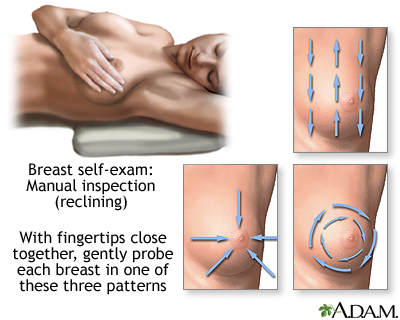A breast self-exam is something a woman does at home to look for changes or problems in her breast tissue. Many women feel that doing this is important to their health.
However, experts do not agree about the benefits of breast self-exams in finding breast cancer or saving lives. Talk to your health care provider about whether breast self-exams are right for you.
Information
The best time to do a monthly breast self-exam is about 3 to 5 days after your period starts. Do it at the same time every month. Your breasts are not as tender or lumpy at this time in your monthly cycle.
If you have gone through menopause, do your exam on the same day every month.
Begin by lying on your back. It is easier to examine all breast tissue if you are lying down.
- Place your right hand behind your head. With the middle fingers of your left hand, gently yet firmly press down using small motions to examine the entire right breast.
- Next, sit or stand. Feel your armpit, because breast tissue goes into that area.
- Gently squeeze the nipple, checking for discharge. Repeat the process on the left breast.
- Use one of the patterns shown in the diagram to make sure that you are covering all of the breast tissue.

Next, stand in front of a mirror with your arms by your side.
- Look at your breasts directly and in the mirror. Look for changes in skin texture, such as dimpling, puckering, indentations, or skin that looks like an orange peel.
- Also note the shape and outline of each breast.
- Check to see if the nipple turns inward.
Do the same with your arms raised above your head.
Your goal is to get used to the feel of your breasts. This will help you to find anything new or different. If you do, contact your provider right away.
Alternative Names
Self-examination of the breast; BSE; Breast cancer - BSE; Breast cancer screening - self exam, breast self-exam
References
American Cancer Society website. American Cancer Society recommendations for the early detection of breast cancer. www.cancer.org/cancer/types/breast-cancer/screening-tests-and-early-detection/american-cancer-society-recommendations-for-the-early-detection-of-breast-cancer.html. Updated December 19, 2023. Accessed December 30, 2024.
Mallory MA, Golshan M. Clinical encounter with the patient. In: Klimberg VS, Gradishar WJ, Bland KI, Korourian S, White J, Copeland EM, eds. Bland and Copeland's The Breast. 6th ed. Philadelphia, PA: Elsevier; 2024:chap 11.
National Cancer Institute website. Breast cancer screening (PDQ) - health professional version. www.cancer.gov/types/breast/hp/breast-screening-pdq. Updated April 10, 2025. Accessed June 3, 2025.
Swartz MH, Nentin FG. The breast. In: Swartz MH, ed. Textbook of Physical Diagnosis: History and Examination. 8th ed. Philadelphia, PA: Elsevier; 2021:chap 16.
US Preventive Services Task Force website. Final recommendation statement. Breast cancer: screening. www.uspreventiveservicestaskforce.org/uspstf/recommendation/breast-cancer-screening. Updated April 30, 2024. Accessed January 6, 2025.
Review Date 1/1/2025
Updated by: Linda J. Vorvick, MD, Clinical Professor Emeritus, Department of Family Medicine, UW Medicine, School of Medicine, University of Washington, Seattle, WA. Also reviewed by David C. Dugdale, MD, Medical Director, Brenda Conaway, Editorial Director, and the A.D.A.M. Editorial team.






